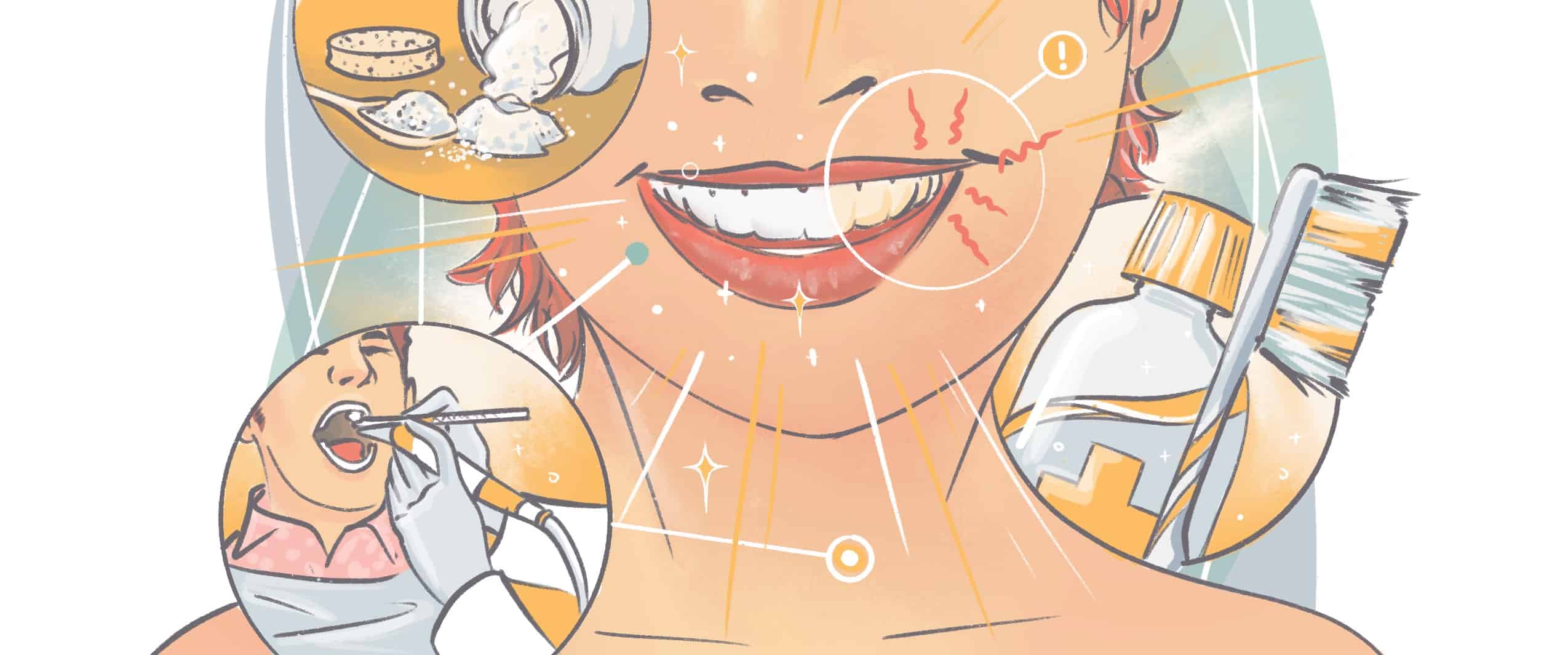Have you ever wondered whether or not you need a mouthguard? If so, this article is just what you need before scheduling your next dentist appointment.
If you’re not sure what questions to ask, don’t worry. You’re certainly not alone, especially if you’re unfamiliar with mouthguards or night-guards.
Though you may be unaware of their purposes, mouthguards work better than you might think to protect your teeth and gums from damage. While wearing the device, you may notice some initial and temporary discomfort; but the oral health benefits are worth the mild inconvenience.
You may be wondering about the purpose of a mouthguard and why they are necessary for some people. So, here are the essentials you should know before you choose which mouthguard works best for you.
In the end, your smile will remain protected, healthy, and beautiful.
What is a mouthguard?
A mouthguard is a dental device that protects your teeth while playing sports. They’re also helpful if you grind and clench your teeth in your sleep.
Either way, mouthguards work well when fitted properly to the shape of your teeth and mouth. Some come in standard sizes, and others include customized fits; they can also be made from different materials.
A common misconception is the difference between dentures and mouthguards. They may seem similar, but they don’t have the same purpose.
Dentures are replacement teeth that substitute for tooth loss, while mouthguards protect wearers against tooth loss.
Mouthguards typically consist of moldable plastic that can fit anyone’s mouth, and they’re also small enough to carry around and use as needed. Therefore, it’s important not to lose your mouthguard.
Who might need a mouthguard?
If you play a contact sport, a mouthguard is strongly recommended. In fact, you may have no choice but to wear one.
No matter which sport you play, health and safety come first. This includes oral health as well as physical health. An injury to the mouth or gum line can cause tooth loss and/or excessive bleeding, and severe damage may require emergency oral surgery.
Due for a checkup?
Find a top rated dentist near you that takes your insurance.
In addition to contact sports, mouthguards can also protect your teeth during other physical activities like riding a bike, skateboarding, or other recreational activities that create the potential for injury to the mouth.
Mouthguards, or nightguards, also work well for those who grind their teeth at night or suffer from sleep apnea.
What are the types of mouthguards?
There are three basic types of mouthguards, including:
- Stock mouth protectors
- Boil-and-bite guards
- Custom-fitted mouth protectors
Here’s what to know about each type, so you know which one may work best for you.
Stock mouth protectors
These mouthguards are widely available at sporting goods stores, and they’re also the least expensive option.
They come in different sizes, but the catch is that they’re not customizable at all and offer just basic protection. They may come in different colors, but the fit is standardized and can’t be changed.
Boil-and-bite guards
This type of mouthguard is easy to fit the shape of your mouth in no time. It also comes in different sizes depending on the condition of your mouth and teeth, but you can customize this type.
The fitting process is pretty easy. You place the new mouthguard in boiling water to soften the plastic. Then, when the material is still warm, put it in your mouth and press the plastic against your teeth.
Once the protector cools down all the way, it will maintain its shape, and you’re ready to hit the practice field.
Custom-fitted mouth protectors
You may have noticed that some professional athletes use uniquely shaped mouthguards. These are custom-fitted to provide the strongest oral protection.
But this type of protector doesn’t necessarily work only for the pros. They’re also helpful for people with braces or any time a dentist decides you need mouth protection.
For example, after oral surgery, you’ll undergo a pivotal period during your recovery in which you’re most vulnerable to re-injuring your teeth. Though custom-fitted mouth protectors can be expensive and require a dentist to professionally fit them, they offer effective protection for those at risk of mouth injury.
How do mouthguards work?
One myth about mouthguards is that they will completely protect teeth and gums against injury. Unfortunately, though mouthguards are effective, they don’t offer full protection.,
If you suffer a severe blow to the mouth, the damage can be catastrophic and require multiple surgeries. Mouthguards may reduce the risk of oral injury, but they cannot prevent it entirely.
Mouth injuries can be serious even when they appear to be minor. For example, even a chipped tooth can lead to infection, worsening cavities, and further damage, if left unchecked. Tooth damage that leads to abscess is also an urgent situation.
Another purpose of a mouthguard is to keep all teeth in line and in the mouth. Without a mouthguard, teeth can splinter and cut into gums or the roof of the mouth. You could also accidentally swallow the pieces of a tooth.
The biggest risk stems from mouth injuries that can cause permanent disfigurement. If you suffer a severe mouth injury, it can alter your appearance for the rest of your life. Such oral trauma can even cause nerve damage in worst-case scenarios.
So, wearing a mouthguard is far better than going without one, especially if you participate in high-intensity physical activity.
Can night-guards ruin your teeth?
Another misconception is that night-guards ruin your teeth instead of helping them. Night-guards are mouthguards worn at night, and their purpose is to protect your teeth against damage while you sleep. Not wearing a night-guard when needed poses far more risk of ruining your teeth.
Due for a checkup?
Find a top rated dentist near you that takes your insurance.
Grinding your teeth in your sleep results in damage over time by wearing down the outer surfaces. Eventually, the teeth may crack, chip, or form a cavity.
The misconception stems from the fact that night-guards can shift teeth over time. In fact, that’s why many dentists use them. It’s an effective way to realign our mouths when we’re younger and still developing.
If you wear a night-guard, you’ll notice that grooves may start to form. That’s not the mouthguard malfunctioning. It’s more likely that the guard doesn’t fit properly and should be checked by your dentist.
How do you take care of a mouthguard?
The good news is that mouthguards are pretty easy to clean.
You can use an ordinary mouthwash to rinse it off, or you can use soapy water. The trick is to use cold water since hot water can alter the guard’s shape over time.
It’s best to avoid keeping your mouthguard in direct sunlight or any area with high temperatures.
But if you need to carry your mouthguard around, make sure that you use a small, sturdy container to avoid accidentally damaging it.
The acrylic type of mouthguard should sit in water when you’re not using it. Otherwise, it will damage the materials and defeat the purpose of paying the expense for an acrylic mouthguard.
How long do mouthguards last?
If you care for your mouth protectors, they should last a long time. However, it’s a great idea to change them out when you start to notice wear and tear.
You can look for areas where the guard isn’t covering your teeth like it used to fit. When a mouthguard is new, it feels less comfortable than later, after getting used to having it in your mouth for extended periods.
It’s essential to never continue using a broken mouth protector because you could harm your teeth. When you take care of it properly, a good mouth protector can last several months unless your dentist says otherwise.
How much do mouthguards from the dentist cost?
Typically, mouthguards don’t cost much if you go for the standard type. You can find plenty available over-the-counter for about $20. Customizable protectors become more expensive from there.
A quality mouthguard from a dentist can cost about $100, and some cost several hundred dollars. It all depends on the type of material you need and the guard’s purpose.
If you need a custom-fitted mouth protector, it costs more for the molding procedure.
That’s why many people choose a quality boil-and-bite mouthguard instead.
Nonetheless, you may have no choice but to pay for a high-priced guard if the health benefits are worth it.
You can also tell how much a mouth protector will cost by its brand name.
What is the best dental mouthguard?
Overall, the best dental mouthguard is one that’s comfortable and does its job: protect your smile!
Picking the right one for your needs depends on what protection you require. For instance, the best guard for night-time use is the Smile Brilliant Night Guard.
There are many options for mouth and night-guards, and that’s why it’s best to consult with a dentist near you. A poorly chosen guard may not work as well, or it may not work at all.
So, if you think you need a mouthguard, don’t hesitate! Make an appointment today to protect and take care of your smile.
Opencare lets you find a dentist in your area quickly without the hassle of calling around to see who’s available.
Due for a checkup?
Find a top rated dentist near you that takes your insurance.








